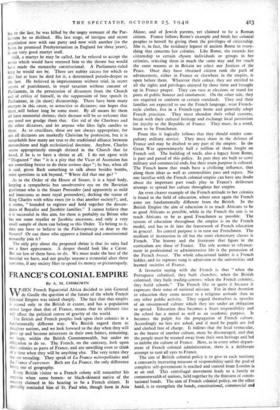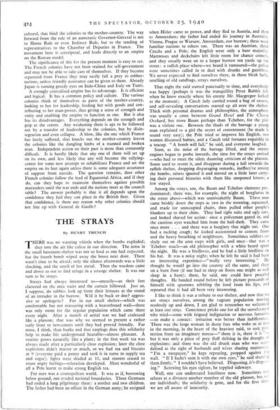FRANCE'S COLONIAL EMPIRE
By A. M. CHIRCWIN
WHEN French Equatorial Africa decided to join General de Gaulle the question of the future of the whole French Colonial Empire was raised sharply. The fact that that empire is second only to the British in extent, and has a population rather larger than that of France, means that its ultimate fate will affect the political centre of gravity of the world.
The British and French peoples look upon their colonies in a fundamentally different way. We British regard them as daughter nations, and we look forward to the day when they will Brow up and become mistresses in their own homes, remaining, we hope, within the British Commonwealth, but under no obligation to do so. The French, on the contrary, look upon their colonies as parts of France, and are unwilling even to think of a time when they will be anything else. The very terms they use are revealing. They speak of La France metropolitaine and La France croutremer. Both are La France, the only difference being one of geography.
Every British visitor to a French colony will remember his surprise when some brown- or black-skinned native of the country claimed in his hearing to be a French citizen. It Probably reminded him of St. Paul who, though born in Asia Minor, and of Jewish parents, yet claimed to be a Roman citizen. France follows Rome's example and binds her colonial peoples to herself by giving them the privileges of citizenship. She is, in .fact, the residuary legatee of ancient Rome in every- thing that concerns her colonies. Like Rome, she extends her citizenship to certain chosen individuals or groups in her colonies, selecting them in much the same way and for much the same reasons as in Britain we select our Justices of the Peace. Once they have obtained citizen rank the path of advancement, either in France or elsewhere in the empire, is open before them. Whatever their colour, they are entitled to all the rights and privileges enjoyed by those born and brought up in France proper. They- can vote at elections or stand for posts of public honour and emolument. On the other side, they are required to conform to certain standards. They and their families are expected to use the French language, wear French- style clothes, live in a French-type home and generally adopt French practices. They must abandon their tribal customs, break with their cultural heritage and exchange local patriotism for loyalty to the Republic of France. They must, in a word, learn to be Frenchmen.
From this it logically follows that they should render com- pulsory military service. They must share in the defence of France and may be drafted to any part of the empire. In the Great War approximately half a million of them fought on French soil. The building of roads, also a legacy from Rome, is part and parcel of this policy. In part they are built to serve military and commercial ends, but their main purpose is cultural. The French know that roads have a civilising influence, that along them ideas as well as commodities pass and repass. No one familiar with the French colonial empire can have any doubt about the important part roads play in France's deliberate attempt to spread her culture throughout her empire.
An even clearer example of the French attitude to her colonies is found in the field of education, where once again the French aims are fundamentally different from the British. In the British Empire the aim of education is to teach Africans to be as good Africans as possible, while in the French the aim is to teach Africans to be as good Frenchmen as possible. The system of education throughout the empire is on the French model, and has to fit into the framework of French education in general. Its central purpose is to turn out Frenchmen. The medium of instruction in all but the most elementary classes is French. The history and the literature that figure in the curriculum are those of France. The sole avenue to advance- ment in professional or administrative life is the possession of the French brevet. The whole educational ladder is a French ladder, and its topmost rung is admission to the universities and learned societies of France.
A favourite saying with the French is that "when the Portuguese colonised, they built churches; when the British colonised, they built trading-centres; when the French colonise, they build schools." The French like to quote it because it expresses their sense of national mission. For in their devotion to education they come nearer to a religious attitude than in any other public activity. They regard themselves as apostles of an unsurpassed culture which they 'are under an obligation to.spread. Education thus becomes a State responsibility and the school has a moral as well as an academic purpose. It becomes the pulpit for the propagation of French culture. Accordingly no fees arc asked, and if need be pupils are fed and clothed free of charge. It follows that the local vernacular, as the bearer of another culture, must be discouraged, and that the people must be weaned away from their own heritage and led to imbibe the culture of France. Here, as in every other depart- ment of French colonial administration, there is a deliberate attempt to turn all eyes to France.
The aim of British colonial policy is to give to each territory a constantly increasing measure of responsibility until the goal of complete self-government is reached and control from London is at an end. This centrifugal movement leads to a family or commonwealth of nations, held together by the flimsiest of consti- tutional bonds. The aim of French colonial policy, on the other hand, is to strengthen the bonds, constitutional, commercial and cultural, that bind the colonies to the mother-country. The way forward from the rule of an autocratic Governor-General is not to Home Rule or even Indirect Rule, but to the sending of representatives to the Chamber of Deputies in France. The movement here is centripetal, and leads directly to an empire on the Roman model.
The significance of this for the present moment is easy to see. The French colonies have not been trained for self-government and may not be able to take care of themselves. If they become separated from France they may easily fall a prey to robber- nations, unless friendly assistance can be given to them. Already Japan is turning greedy eyes on Indo-China and Italy on Tunis.
A strongly centralised empire has its advantage. It is efficient and logical. It has a common policy and culture. The various colonies think of themselves as parts of the mother-country, looking to her for leadership, feeding her with goods and con- tributing to her man-power, thus giving a sense of strength and unity and enabling the empire to function as one. But it also has its disadvantages. Everything depends on the strength and grip at the centre. Any weakening there is apt to be followed not by a transfer of leadership to the colonies, but by disin- tegration and even collapse. A blow, like the one which France has lately suffered, that knocks out the mother-country leaves the colonies like the dangling limbs of a stunned and broken man. Independent action on their part is more than commonly difficult. It is hardly likely that any one of them will set up on its own, and less likely that any will become the rallying- centre for some new attempt to rehabilitate France and set the empire on its feet again unless there is some adequate assurance of support from outside. The question remains, dare other French colonies follow the lead of Equatorial Africa, and if they do, can they hope to maintain themselves against possible marauders until the war ends and,the nations meet at the council table? The answer probably is that it all depends upon the confidence they feel they can place in the British fleet. Given that confidence, is there any reason why other colonies should not line up with General de Gaulle?



























 Previous page
Previous page